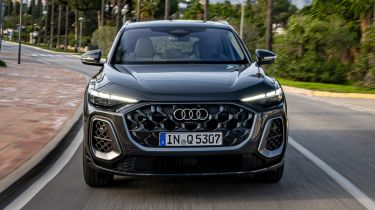Audi Q5 - Reliability & safety
The Q5 is equipped with lots of safety features as standard, but Audi performed very poorly in Driver Power satisfaction survey

The Mk3 Audi Q5 hasn’t yet received a crash safety score from industry experts Euro NCAP, however it’s a sure bet that it’ll receive the maximum five-star score as the last model did. The new Audi A5, which is based on the same platform as the mid-size SUV, also got the full five out of five when it was tested last year.
It certainly helps that the Q5 comes with a suite of advanced driver-assistance and safety features, including a 360-degree parking camera system, adaptive cruise control, traffic-sign recognition, cross-traffic alert, swerve assist, handsfree parking system, lane-departure warning, and an advanced driver-attention and fatigue monitoring.
The Audi Q5 didn’t make it onto our most recent list of the best cars to own, which is based on the 2024 Driver Power owner satisfaction survey – but the Audi A1, A4 and A5 were among the top 50 cars to own.
However, Audi as a brand didn’t fare well at all in Driver Power, and finished 27th (out of 32) in the best car manufacturer rankings, making it the worst performing premium brand. Mercedes didn’t do a lot better, finishing 25th, but BMW claimed 14th spot and Lexus came 12th.
| Key standard safety features | Euro NCAP safety ratings |
|
|
Warranty
The Audi Q5 comes as standard with a three-year/60,000-mile warranty (whichever comes first). That’s adequate by today’s standards. The BMW X3 and Mercedes GLC also get three years of coverage, but with no mileage limits for that time. Meanwhile, the Lexus NX gets a three-year/60,000-mile warranty, but drivers receive a further 12 months’ cover each time the car is serviced at a Lexus Service Centre – up to a total of 10 years or 100,000 miles.
At least Audi offers extended warranty packages to its customers, and on the Q5 you can get a four-year/75,000-mile warranty for £605, or coverage for up to five years/90,000 miles for £1,415.
Servicing
Audi has fixed and flexible servicing schedules that differ slightly. The brand recommends the flexible option if you drive longer distances, typically on motorways, and this includes an oil service every year/9,300 miles, plus an inspection service every two years/18,600 miles. The fixed schedule is better for those who cover fewer miles, and spend more time in town, with Audi recommending drivers bring their car in for a service every two years/18,600 miles.








